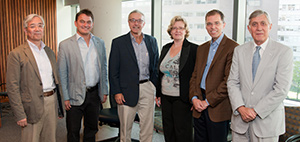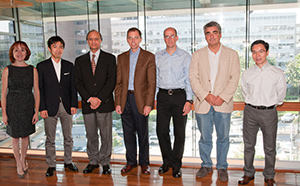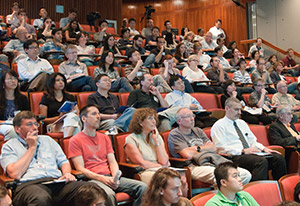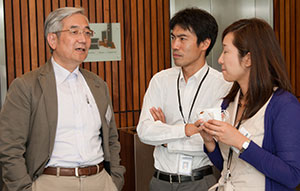

Stimulating Stem Cells
Symposium Highlights Einstein's Investment in Stem Cell Research
On Friday, September 14, 2012, Einstein’s Ruth L. and David S. Gottesman Institute for Stem Cell and Regenerative Medicine Research held its first symposium, exploring current progress in stem cell biology. During the past decade, the field has become a global research, largely due to the profound implications for human health.

Guest speakers, Drs. Toshio Suda, Andreas Trumpp, George Q. Daley and Kathrin Plath pose with Einstein’s Dr. Paul Frenette and Dr. Allen M. SpiegelAll multicellular organisms have stem cells, or precursor cells, which divide and differentiate into specific tissue types at all developmental stages. Stem cells also have self-renewal properties that allow them to act as a repair system for the body that can replenish tissues in adults. These properties speak to the limitless potential stem cells possess, and to the greater knowledge scientists seek toward applying them to human healing.
In 2007, a Strategic Research Plan developed at Einstein called for the creation of an institute that could bring the College of Medicine to the forefront of stem cell and regenerative medicine research. During the subsequent five years, Einstein established the Gottesman Institute, led by its chair and director, Dr. Paul Frenette — a leading stem cell and vascular biology researcher — and staffed with both longtime Einstein scientists and new recruits.

Morning presentations were made by Einstein faculty members (from left): Drs. Teresa Bowman, Keisuke Ito, Sanjeev Gupta, Paul Frenette, Ulrich Steidl, Eric Bouhassira and Wenjun Guo A morning session leading up to the symposium offered members of the Einstein faculty the opportunity to attend a series of research talks given by colleagues — including three newly recruited researchers in the areas of cancer stem cell biology (Dr. Wenjun Guo), stem cell metabolism (Dr. Keisuke Ito) and tissue regeneration (Dr. Teresa Bowman). All speakers discussed projects currently under way and responded to questions about their work.
In the afternoon, the symposium began with opening remarks from Dr. Frenette, followed by an introduction of the speakers, whose work he said would “illustrate the power of stem cell research.” With LeFrak Auditorium filled to capacity, additional rooms offering video feeds of the presentation were put to use, allowing others interested in the subject matter to view the lectures remotely.

LeFrak Auditorium was filled to capacity In turn, the four world-renowned researchers — Dr. George Q. Daley, Dr. Kathrin Plath, Dr. Toshio Suda and Dr. Andreas Trumpp — delivered presentations focusing on three key areas of research: embryonic and induced pluripotent stem cells, metabolism and stem cells, and stem cells in the context of cancer. Enthusiam brimmed at Einstein’s Price Center/Block Research Pavilion as presenters discussed the promise of their research.
“The presentations throughout the day represent ongoing research that could have important implications for human health, including developmental disorders, aging, cancer, diabetes, wound healing, among other diseases,” said Dr. Frenette. “The symposium’s speakers nicely illustrated the tremendous progress that has been made thus far and showed how outstanding research is helping us to realize the full potential of stem cells.”
The event also provided a valuable vehicle for scientific exchange and establishing potential research collaborations. Dr. Frenette noted, “It was truly rewarding to observe many dialogues at the reception that were precipitated during the question-and-answer sessions following each talk.”
Stem Cell and Regenerative Medicine Research Gain Momentum at Einstein

Presentations led to lively discussions The Ruth L. and David S. Gottesman Institute for Stem Cell and Regenerative Medicine Research was established thanks to generous endowments, along with external funding from sources including the National Institutes of Health and New York State Stem Cell Science (NYSTEM). Einstein has been awarded more funding from NYSTEM than any other institution in New York.
Einstein is recognized for a number of significant research contributions pertaining to bone marrow biology, liver-directed therapies, neuronal stem cells in the brain, techniques for generating blood cells and stem cell-based treatments for diabetes. The institute, with laboratories in Einstein’s Price Center/Block Research Pavilion, as well as across four other research buildings, draws on the work of more than 25 Einstein faculty members whose research encompasses six research themes:
- Embryonic stem cell differentiation and modeling;
- Hematopoietic and cancer stem cells;
- Neuroscience;
- Model organisms of stem cell biology;
- Cardiovascular progenitors; and
- Liver regeneration.
“Our aim is to leverage our resources and collaborative environment to establish productive research partnerships and expand the footprint of the institute within the field of stem cell biology and regenerative medicine,” said Dr. Frenette. “All of the work to date, which helped establish the institute and our various research programs, assure a bright future for Einstein within the stem cell field.
In addition, funding from NYSTEM supports Einstein’s Comprehensive Pluripotent Stem Cell Center. The College of Medicine has teamed with Montefiore Medical Center, the University Hospital for Einstein, to establish consortia for blood cell disease and liver transplantation in the state of New York.
Posted on: Friday, October 19, 2012

Tablet Blog